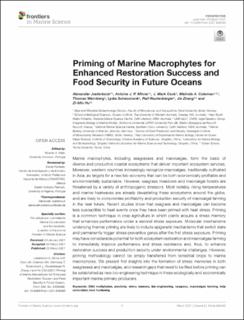Priming of marine macrophytes for enhanced restoration success and food security in future oceans
Jüterbock, Alexander; Minne, Antoine J.P.; Cock, J. Mark; Coleman, Melinda Ann; Wernberg, Thomas; Scheschonk, Lydia; Rautenberger, Ralf; Zhang, Jie; Hu, Zi-Min
Peer reviewed, Journal article
Published version
Permanent lenke
https://hdl.handle.net/11250/2765766Utgivelsesdato
2021Metadata
Vis full innførselSamlinger
Originalversjon
Jueterbock, A., Minne, A. J. P., Cock, J. M., Coleman, M. A., Wernberg, T., Scheschonk, L., Rautenberger, R., Zhang, J. & Hu, Z.-M. (2021). Priming of marine macrophytes for enhanced restoration success and food security in future oceans. Frontiers in Marine Science, 8: 658485. doi: 10.3389/fmars.2021.658485Sammendrag
Marine macrophytes, including seagrasses and macroalgae, form the basis of diverse and productive coastal ecosystems that deliver important ecosystem services. Moreover, western countries increasingly recognize macroalgae, traditionally cultivated in Asia, as targets for a new bio-economy that can be both economically profitable and environmentally sustainable. However, seagrass meadows and macroalgal forests are threatened by a variety of anthropogenic stressors. Most notably, rising temperatures and marine heatwaves are already devastating these ecosystems around the globe, and are likely to compromise profitability and production security of macroalgal farming in the near future. Recent studies show that seagrass and macroalgae can become less susceptible to heat events once they have been primed with heat stress. Priming is a common technique in crop agriculture in which plants acquire a stress memory that enhances performance under a second stress exposure. Molecular mechanisms underlying thermal priming are likely to include epigenetic mechanisms that switch state and permanently trigger stress-preventive genes after the first stress exposure. Priming may have considerable potential for both ecosystem restoration and macroalgae farming to immediately improve performance and stress resistance and, thus, to enhance restoration success and production security under environmental challenges. However, priming methodology cannot be simply transferred from terrestrial crops to marine macrophytes. We present first insights into the formation of stress memories in both seagrasses and macroalgae, and research gaps that need to be filled before priming can be established as new bio-engineering technique in these ecologically and economically important marine primary producers.

